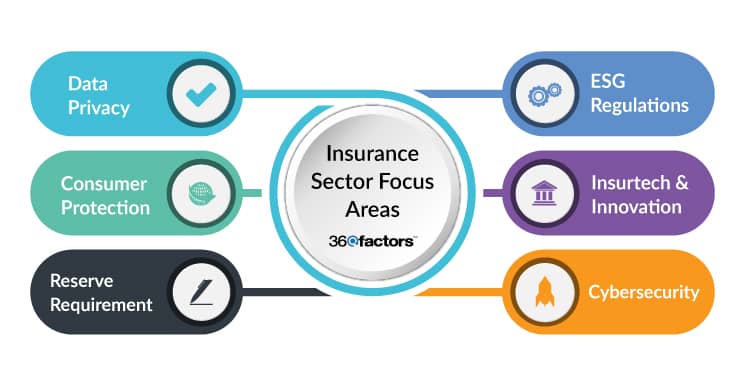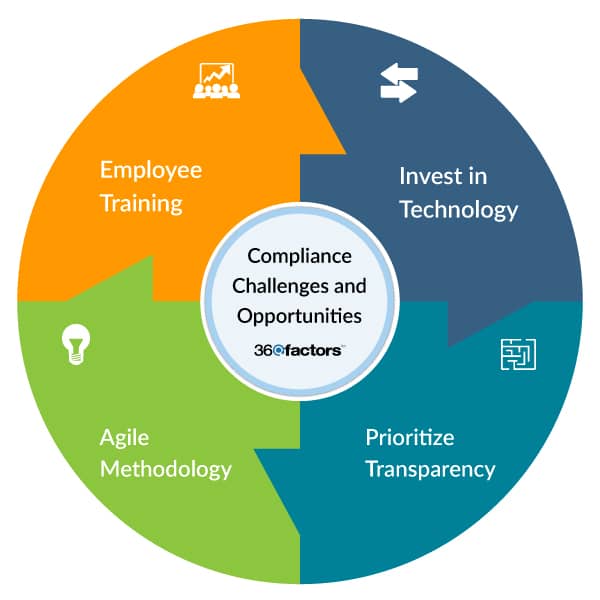Home/ Blog / Compliance and Regulatory Focus to Impact the Insurance Sector
Given the unprecedented pace of technological advancements, shifting consumer expectations, and a global commitment to sustainability in recent years, the insurance industry is facing a period of profound transformation. Regulatory bodies are taking a more active role in shaping the future of insurance through a multifaceted lens encompassing environmental, technological, consumer-centric, and financial considerations.
In this blog, we consider the regulators’ major areas of focus for the sector, and what insurance companies can do to turn these challenges into opportunities for growth.
Environmental, Social, and Governance (ESG) Regulations
As global awareness of climate change intensifies, regulatory bodies are taking significant strides to ensure that insurance companies actively contribute to environmental sustainability. Insurers are now required to assess and disclose their environmental impact, ranging from their own operational practices to the environmental footprint of their investment portfolios.
For instance, regulators may mandate the disclosure of carbon emissions for businesses that are covered by an insurance firm. This will push insurers to adopt eco-friendly business practices and investments when underwriting new business clients. Compliance with such regulations aligns insurers with global sustainability goals and helps in building resilience against the financial impact of climate-related risks.
Regulators are also focusing on insurers’ social responsibilities towards the communities they serve. Insurers must respond to societal challenges, such as inclusivity, diversity, and community well-being. They must adopt policies that promote social responsibility while regulators closely monitor the impact of these initiatives.

Social initiatives also include considerations related to fair practices in underwriting, support for underrepresented communities, and measures to ensure that insurance products cater to diverse customer needs.
Regulators are also focused on enhanced governance for the insurance sector. Businesses are urged to implement transparent, accountable, and ethical practices to maintain customer confidence. Regulatory bodies are keen on ensuring that insurers maintain robust governance structures, effective risk management processes, and ethical decision-making frameworks.
Compliance with governance standards extends particularly to board composition, executive compensation, and measures to prevent fraud and corruption within the organization.
Embracing Insurtech and Innovation
Regulators are increasingly acknowledging the role of technology in enhancing efficiency, reducing costs, and improving customer experiences within the insurance sector. This support has been manifested in various ways, such as streamlined approval processes for innovative products and services, encouraging insurers to test new technologies in a controlled setting, and guidance on regulatory compliance for emerging technologies like artificial intelligence and predictive analytics.
Regulators are fostering collaboration between insurers and technology startups by providing guidance and support for joint ventures, partnerships, and investments. This collaborative approach allows insurers to leverage the agility and innovation of startups while ensuring compliance with regulatory requirements.
Cybersecurity and Data Privacy Regulations
As insurers increasingly rely on digital platforms to collect and process data, regulatory bodies are also placing a strong emphasis on data security and privacy standards. According to an IBM report, the average cost of a data breach reached an all-time high of USD 4.45 million in 2023.
New legislation has been introduced to refine and improve data protection laws mandating insurers to handle customer data responsibly. Stringent requirements demand that insurers collect, store, and process data in a secure and transparent manner, with a heightened focus on obtaining explicit consent for data usage. Stricter regulations also mandate that insurers implement robust cybersecurity measures, secure customer data, and comply with data protection laws.
With the rising frequency and sophistication of cyberattacks, regulators are responding with severe penalties for data breaches. Insurance firms that fail to implement adequate cybersecurity measures face not only financial repercussions but also reputational damage.
Recognizing the interconnected nature of the modern business ecosystem, regulators are also placing greater emphasis on managing third-party risks. Insurers must conduct thorough assessments of the cybersecurity measures implemented by their vendors and partners to ensure the overall security of their data ecosystem.
Increased Scrutiny on Consumer Protection
Regulators are placing a heightened emphasis on the clarity and comprehensibility of insurance policies. Insurers are expected to use plain language and transparent terms in policy documents to ensure that consumers fully understand the scope, limitations, and exclusions of their coverage.
To promote transparency in the insurance industry, regulators are emphasizing stringent disclosure upfront. Insurers are expected to provide comprehensive information to policyholders about the terms and conditions of their policies, ensuring that consumers are fully informed before making purchasing decisions. Additionally, to promote fair pricing practices, insurers are prevented from adding hidden costs to the policy later. Insurers are expected to provide clear information about premium calculations, additional charges, and any potential adjustments throughout the policy period.
Lastly, regulators have also been increasingly attentive to the rights of vulnerable consumer groups, such as the elderly or economically disadvantaged, in recent years. Insurers are expected to implement measures to ensure that these groups are not unduly disadvantaged in the insurance marketplace.
Capital, Reserve Requirements, and Solvency Monitoring
Regulators are placing increased emphasis on the financial resilience of insurance companies. Insurers are required to maintain sufficient capital to cover potential risks, ensuring they have a robust financial foundation to honor claims and withstand adverse economic conditions.
Regulators are also scrutinizing insurance firms’ reserve requirements and risk management practices to prevent over-extension of liabilities. Adequate reserves are crucial for insurers to fulfill their obligations to policyholders, and regulators are introducing new guidelines to ensure accurate assessment and management of risks.
Compliance Challenges and Opportunities
The insurance sector faces frequent updates and changes in regulatory requirements. Staying compliant with these changes can be a significant challenge for insurance companies, especially those operating across multiple jurisdictions. Investing in robust compliance management systems like Predict360 Regulatory Change Management (RCM) can streamline the process of tracking regulatory changes. It provides real-time updates, automated monitoring, and centralized repositories for regulatory information, enabling insurers to stay ahead of the curve.

Another major emphasis of regulators is on data protection and customer privacy. Meeting the stringent requirements for data security and privacy can be resource-intensive and complex. Embracing technological solutions such as encryption, secure data storage, and advanced cybersecurity ensures compliance and enhances the overall security posture of insurers.
Regulatory focus on a more consumer-centric approach demands that insurers prioritize transparency, fair treatment, and clear communication with clients. Insurers can turn this challenge into an opportunity by leveraging technology, such as user-friendly interfaces and chatbots for customer queries, to enhance communication and customer experience. Not only does this satisfy regulatory expectations, but it also improves customer satisfaction and loyalty.
Meeting stringent capital, reserve, and solvency requirements necessitates careful financial planning and risk management for insurers. Innovations in financial modeling, risk analytics, and collaborative investment strategies can help insurance firms optimize capital allocation and enhance overall financial stability.
Adapting new operational processes to comply with changing regulations can put stress on resources and disrupt previously established workflows. Remaining compliant while regulations are changing can become a perpetual challenge for insurers. However, automation, AI, and data analytics can significantly enhance operational efficiency in such an environment. Implementing an agile project management methodology and fostering a culture of adaptability can position insurance firms to become innovative industry leaders.
Employee training is another challenge posed by regulatory changes. Insurers must deliver comprehensive and accessible training programs to their workforce to remain compliant. This presents an opportunity to implement e-learning platforms, interactive training modules, and regular communication channels that make compliance training more engaging and effective for insurers’ workforce.
Conclusion
The regulatory environment in the insurance industry is dynamic, responding to the evolving needs of a rapidly changing world. While compliance may present challenges, it also offers a pathway for insurers to demonstrate resilience, innovation, and a commitment to societal and environmental well-being.
As the regulatory landscape continues to evolve, comprehensive compliance management solutions, such as the Predict360 Risk and Compliance Management platform, stand as integral tools for insurers. It provides the agility and insight necessary to meet regulatory obligations and lead the industry toward a future characterized by responsible, innovative, and customer-centric practices.
Both challenges and opportunities mark the journey ahead. Insurance businesses that navigate these waters with adaptability and foresight will undoubtedly emerge as leaders in a redefined insurance landscape.
Request a Demo
Complete the form below and our business team will be in touch to schedule a product demo.
By clicking ‘SUBMIT’ you agree to our Privacy Policy.



